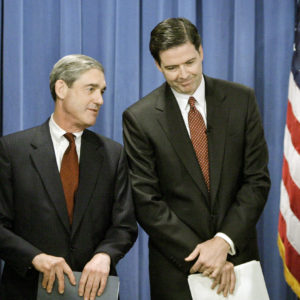There is no doubt that the inspector general’s report on the FBI’s handling of the Hillary Clinton email investigation is going to be treated like a giant Rorschach test. President Trump’s partisans will froth about the “deep state,” while Clinton will wail about how James Comey stole the election from her.
But the inspector general’s report actually makes the FBI look pretty good. The report found no evidence that anti-Trump political bias had any effect on any of the FBI’s decisions. In fact, what mistakes were made can fairly be viewed as an effort to not be “pro-Clinton,” even though the FBI thought Clinton was extremely likely to be elected president.
While I have questioned Comey’s judgment, I have never questioned his integrity — and the inspector general’s report agrees. The investigation concluded that the Clinton email probe was handled appropriately, and that its decision not to charge Clinton was reasonable and in keeping with prior practice at the Department of Justice.
Where Comey really went wrong — and he did so for the best of motives — was in his decision to discuss publicly the decision not to file charges. He felt that this unprecedented transparency — the FBI never typically discusses the details of why they have closed an investigation without filing charges — was necessary because of the “need to preserve the credibility and integrity of the department and the FBI, and the need to protect a sense of justice more broadly in the country; that things are fair, not fixed; and they’re done independently.’”
The inspector general disagreed and faulted Comey’s judgment but not his professionalism. “While we found no evidence that Comey’s statement was the result of bias or an effort to influence the election, we did not find his justifications for issuing the statement to be reasonable or persuasive. We concluded that Comey’s unilateral announcement was inconsistent with department policy and violated longstanding department practice and protocol by, among other things, criticizing Clinton’s uncharged conduct.”
Another sore point for President Trump and his supporters was the anti-Trump bias exhibited by some FBI agents, particularly Peter Strzok and Lisa Page, who texted their dislike of then-candidate Trump while using official FBI phones. But the key point here is not that FBI agents are humans who occasionally slip and engage in less-than-ideal behavior. The key point is that the culture of internal transparency at the FBI was an effective check on these inevitable human failings: Strozk and Paige’s personal bias did not affect the decisions made by the FBI because these decisions were made as a group rather than by a single individual.
As the inspector general put it, “We found that Strzok was not the sole decisionmaker for any of the specific (Clinton email) investigative decisions we examined. … We further found evidence that in some instances Strzok and Page advocated for more aggressive investigative measures in the (Clinton email) investigation, such as the use of grand jury subpoenas and search warrants to obtain evidence.”
Apparently, despite their personal political views, even Strzok and Page maintained their professionalism.
The inspector general was perfectly correct to investigate how the FBI handled the momentous investigation into then-Secretary Clinton’s email server. Given the stakes and the stress, it is not surprising that the inspector general concluded that some things about the investigation — especially the decision to make a public statement about the reasoning behind the decision not to charge Clinton — could have been handled better.
But the takeaway here is that the FBI, in the middle of the most contentious presidential election in living memory, managed to navigate a difficult, complex and politically charged investigation and managed to get it almost entirely right, and all without compromising its independence or, as an organization, its professionalism.
Yes, mistakes were made, especially Comey’s decision to depart from established departmental protocol to discuss publicly the investigation. But those were errors of judgment made in good faith rather than some corrupt scheme to influence the election. And, if anything, these errors of judgment only benefitted Trump the candidate, so he has little to complain about.
The inspector general’s report confirms what Americans have always believed: The FBI is made up of straight shooters who let the chips fall where they may without fear or favor. Yes, they may occasionally miss their aim, as do we all. But as a group, an institution, and a culture, they are fiercely dedicated to professionalism and upholding the rule of law even under the most difficult conditions.
Donald Trump might not like it. Hillary Clinton might not like it. But the FBI’s job isn’t to be liked; it’s to uphold the rule of law. And, according to the inspector general, that’s exactly what the FBI did.

